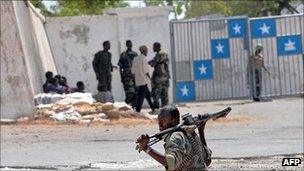The nature of President Obama's rendition programme
- Published
- comments
NEW YORK - Talking the other day here to General Jack Keane, external, he made a passing reference to the Obama administration's rendition policy.

President Obama closed the CIA’s secret interrogation programme
Gen Keane was acting head of the US army at the time of the invasion of Iraq and, later, in 2006-7 a key advocate of the Iraq surge, external.
He is an insider, so his remark naturally aroused my interested, as I had assumed the incoming president ended this practice.
The bigger point being made by the general was that the Obama administration's policy on fighting terrorism is in some ways every bit as robust as that of his predecessor.
Gen Keane argues the differences centre, "mainly on Iraq", a venture that President Barack Obama opposed and has always sought to bring to an end as fast as is practically possible.
Black sites closed
So what about rendition, has Mr Obama authorised it?
During the 2007 presidential campaign the candidate Senator Obama wrote that building a better world required, "ending the practices of shipping away prisoners in the dead of night to be tortured in far-off countries".
Soon after taking office, he halted the holding of suspects in so-called black or ghost sites - unacknowledged CIA prisons in third countries where detainees were interrogated by Americans.
People who had been kept in such places were sent to Guantanamo as the holding facilities were shut down.

UK rights group Reprieve claims there is a CIA site under the presidential compound in Mogadishu
So I asked a trusted contact here whether he thought that the US still maintained ghost sites.
"That's classified," he replied deadpan.
How to sum up the current policy then? The US still has a programme to render terrorist suspects to their countries of origin.
Former CIA director Leon Panetta, external told the senate, during confirmation hearings in 2009, that this would continue with appropriate assurances from the host government that the people would not be mistreated.
This is the sense in which Mr Obama's pledge to stop the practice of shipping away terrorists so they might be tortured has been fulfilled.
As intelligence files recovered in Tripoli show, external, the US was already seeking such assurances from the likes of Colonel Muammar Gaddafi's regime under the Bush administration.
Human rights advocates consider pledges from these countries worthless. This remains a live issue, in recent days the Somali government has denied that it has been holding suspects sent by the Americans.
Intelligence gains
There is another aspect to this form of counter-terrorism too. Interrogation operations remain a vital source of intelligence both in protecting people at home and the likes of US or UK forces in places like Afghanistan.
So while the CIA has got rid of its ghost sites, the military maintains its own facilities. The US has the ability both to hold prisoners in Bagram in Afghanistan, at another site run by the Joint Special Operations Command (JSOC, is the special operations organisation that carried out the Bin Laden operation) in Afghanistan and aboard US Navy ships on the high seas.
There are other options too for Western interrogators to quiz suspected terrorists in facilities operated by third countries, such as Afghanistan.
As the US marks the 9/11 anniversary, and is anxious to prevent any repetition of that catastrophe, it retains a good many options for spiriting people away for interrogation.
The counter-terrorist experts insist that there may still be cases where they need to conceal for a time from a suspect's accomplices or family that they have him while they open up a terror network - and Mr Obama has insured that they still can.